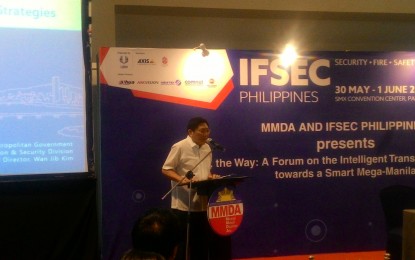
MMDA Chairman Danilo Lim says an intelligent transport system will ensure the integration of local government units to formulate a comprehensive solution on easing traffic congestion in Metro Manila during a forum held Thursday at the SMX Convention Center, Mall of Asia Complex in Pasay City.
MANILA -- The Metropolitan Manila Development Authority (MMDA) is eyeing to adopt the intelligent transport system (ITS) being used by South Korea to effectively address the traffic situation in Metro Manila.
The technology will ensure the integration of local government units (LGUs) to formulate a comprehensive solution to ease traffic congestion in the metropolis.
MMDA chairman Danilo Lim said it is urgent to use modern technology to deal with traffic, flood control and urban planning and renewal in Metro Manila.
“The MMDA is exploring innovative solutions aimed to reshape the traffic and transportation network, taking into account the cause of traffic in Metro Manila, home to an estimated daytime population of 15 million,” Lim said during Thursday's forum on the use of Intelligent Transportation System towards creating A Smart Mega Manila.
“Developing countries are utilizing intelligent transport system to mitigate traffic congestion in their country. It is about time we think forward and employ smart solutions like the Intelligent Traffic System,” Lim said.
The forum was organized by MMDA and the International Fire and Security Exhibition and Conference at the SMX Convention Center at the Mall of Asia Complex in Pasay City.
During the forum, Dr. Kim Wan Jib, information communications security division director of the Seoul Metropolitan Government, presented the Transportation Operation and Information Service (TOPIS), an integrated traffic management facility that operates and manages Seoul’s traffic flow.
TOPIS serves as a traffic control system in Seoul, which gathers a wide range of traffic information from the Bus Management System, current traffic situation from the Transport Card System and other sources.
Real-time information are processed and provided to traffic facility users and public transportation information managers operating buses, subway trains, and parking facilities, among others.
These data can be used to help map out alternative routes for motorists in case of heavy traffic congestion and road accidents. Traffic information can also be used by citizens to know the schedule of arrivals and departures as well as the routes of buses.
Kim said various districts in Seoul have at first raised objections toward the implementation of the system but were eventually persuaded of its benefits after the city government waged its public information campaign.
“Seoul has 25 districts since there are different local government units, the hardest part is for them to unite and integrate their systems. I have to convince them to integrate their systems,” he said.
The districts in Seoul have decided to contribute funds that amounted to USD25 million for the implementation of the ITS in the city.
Kim also said that the Seoul city government is willing to provide assistance to the MMDA and LGUs in Metro Manila by providing its expertise on information technology to ensure the implementation of the system.
ITS is a system in which information and communications technology is applied in the field of road transportation, including infrastructure, vehicles and users, and in traffic management and mobility management, as well as for interfaces with other modes of transport. It hopes to improve the efficiency of transport in a number of situations, such as road transport, traffic management, and mobility.
A recent study from the Japan International Cooperation Agency showed that the Philippines is losing PHP3.5 billion a day due to worsening traffic in Metro Manila.
Among the reasons that contribute to the traffic problem in Metro Manila are the increasing number of private vehicles, inadequate road infrastructure, and lack of efficient public transportation vehicles. (PNA)
